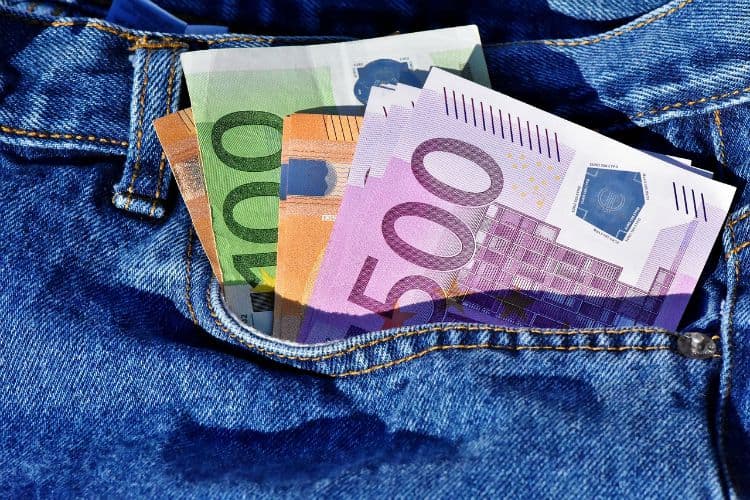Travel
Traveling Abroad? Leave Your Cash at Home

Times have changed, and it’s no longer necessary to exchange cash as soon as you arrive in a foreign country. In fact, you can save time and money – and prevent theft – by using your bank card or credit card, which will usually give you a more competitive exchange rate. But, before traveling abroad, it pays to research banks and credit cards so you can avoid foreign transaction fees.
Exchange Booth Visits Unnecessary, Unsafe When Traveling Abroad
Traveling abroad, you often overhear stories of first-time travelers who have been ripped off at local money exchanges or, worse, pick-pocketed out of large sums of cash. Many travelers, it seems, are unaware of how far and wide global banking and the cashless society have spread, and falsely believe they need to manually exchange cash the moment they arrive on foreign soil.
The reality is that most travelers should never need to visit the exchange booth – and doing so is actually risky.
Your Bank is More Regulated than Money Exchanges
This is not to say that you can always travel out of the country without obtaining local currency. In all likelihood, you’ll want to have some cash on hand when traveling abroad. But the places that you would think are regulated to give you a fair market rate are often the worst of all.
Airports, in particular, are notorious for their horrible exchange rates – and there’s no guarantee that the guy a few streets away is any better. And even then, you’ll want to carefully count the coins and dollars while the line is building up behind you.
By and large, the most convenient and affordable option when traveling abroad is simply to pull your money out of an ATM with your bank card. American banks are highly regulated and have to give you competitive exchange rates, and the most they can ding you on is an ATM fee (more on how to avoid these later).
The expert traveler himself, Rick Steves, recommends avoiding money exchanges altogether and taking money out at the airport ATM upon arrival.
Pay with Plastic for Comparable Exchange Rates
Paying directly with your credit card or bank card are good options if you want to avoid cash altogether when traveling abroad, although this is more feasible on a short trip to a developed country. Nearly everyone accepts credit these days, and the exchange rate will be comparable to your bank’s at the ATM.
If you decide to go this route, it’s a good idea to purchase more services online in your domestic currency where possible, like mobile taxis and hotels. With credit cards, you have to watch out for foreign transaction fees, which we’ll discuss more below.
Bank Cards and Credit Cards Are More Secure Than Cash
Both credit and bank cards offer more security than cash when traveling abroad because you can dispute fraudulent transactions and cancel your cards if stolen.
With bank cards, you can take out what you need at the time, rather than exchange everything all at once, so you won’t have to exchange as much money back to your currency when you leave (and lose money in the process).
One strategy is to keep a card and small sums of cash on your person and leave a backup card at the hotel. If one card disappears, you can report it immediately and stop any fraudulent transactions from going through.
If your cash is taken, nobody is going to reimburse you. Often the thought of a big stash hiding back at the hotel, even if it’s locked, can cause a lot of stress when you should be enjoying yourself while traveling abroad.
Avoid Foreign Transaction Fees
While most reputable banks and credit card companies offer decent exchange rates and low-ish foreign transaction fees, it does pay to shop around, especially if you plan on traveling frequently. The Points Guy gives a rundown of some quality cards, with Chase Sapphire coming out on top. Capital One cards are also associated with low or zero foreign transaction fees.
Foreign transaction fees for bank cards and ATM withdrawals can be more difficult to determine. Usually, it’s best to call the bank and ask about their foreign fee schedule. If the foreign transaction fees are high, you may want to look into getting a new checking account. In general, online banks like Charles Schwab and Ally tend to be more generous about refunding ATM fees, even when you’re abroad.
Don’t be duped into thinking that you need to rely on cash and the local money exchanges when traveling abroad. ATMs are available in the far-flung corners of the globe and credit is accepted most everywhere.
Just one big reminder before you go: Inform your bank of your travel dates and locations. This isn't always necessary, but you don't want to risk getting locked out of your account when you try to withdraw money on the other side of the planet.










Pingback: The Capitalist: “Traveling Abroad? Leave Your Cash at Home” – Dan Bablinskas